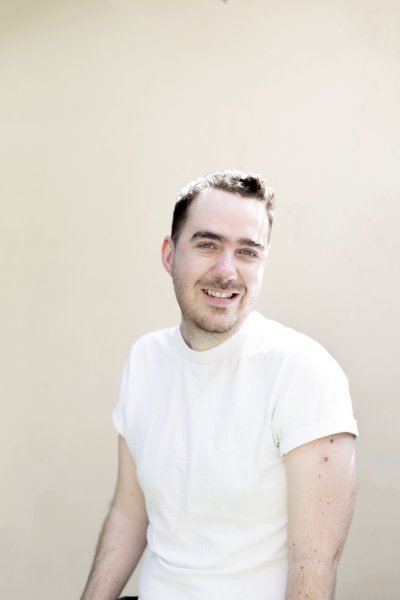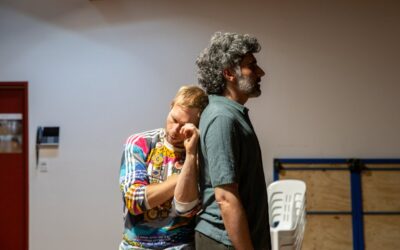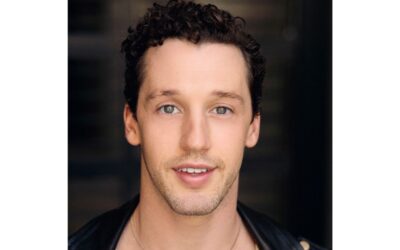About a disability influencer and body positivity activist, comedian Alistair Baldwin’s debut play, Telethon Kid, is about to hit the Malthouse Theatre stage.
Exploring the life of protagonist Sam, who rises to fame as the poster child of Perth Children’s Hospital 2007 Telethon, Telethon Kid is possibly more of a tale of Baldwin himself as he, too, grew up intimately familiar with being the spectacle of medicine as well as the massive yearly hospital charity drives and its by-product – the Channel 7 Telethon kids.
Baldwin was born with a rare muscular disorder and lives with muscular dystrophy. He grew up in Perth, which, he describes, as basically the Rare Disease Child capital of Australia.
“Every year they broadcast this massive, live telethon to raise money for the local Perth kids hospital – where I’d go to see my neurologist growing up.
While I was never personally a Telethon Kid (a source of immense jealousy for me – I suppose I wasn’t sick and/or photogenic enough for primetime), I think anyone born with a rare disease understands growing up as something of a spectacle.
I liken it to being a child star. You’re told you’re interesting, singular, one in a million. You’re regularly stared at in public. You get a lot of attention. And like many child stars… a lot of us end up buying the hype and becoming narcissistic adults. I mean, I’m a fucking writer. Clearly some part of me agreed with all the neurologists and geneticists who labelled me an ‘utterly fascinating specimen’ growing up.
That’s really what compelled me to write this play – I wanted to explore how that kind of attention shapes a child into their adulthood: their personality, their body image, their sex life.”
Three years into the global pandemic, Baldwin thinks a play that examines the messy intersection of money and medicine is hyper relevant to all of us – whether you’re abled or disabled. “So much of this play is informed by that weird era where people had brand loyalty to which specific big pharma vaccine they got – were you Team #Pfizer or #AstraZeneca?
It’s interesting. I think a lot of us know intellectually to be sceptical of huge multinational corporations. By the same token, these corporations did save lives. Does the halo effect of ‘saving lives’ mean they deserve a bit more leeway than other corporations? Is it bad these corporations turned a profit in a pandemic – or is it well-deserved?
Telethon Kid also explores this on a smaller scale: do doctors deserve more leeway for individual actions if they’re saving lives along the way? Would you rather an okay doctor with a heart of gold, or a fantastic doctor… who only got into medicine because it pays well.
If the past three years have taught us anything, it’s that even young and abled people need to think about medical ethics – the very notion of public health reminds us that all our medical fates are connected, and being healthy doesn’t mean you’re outside of this system.”
Baldwin grew up under the care of hospitals and doctors but what was it like being stared at, examined, prodded and pathologised and was writing Telethon Kids in the least bit cathartic.
“As much as I easily rattle off jargon terms like ‘compound heterozygous’ or ‘extracellular matrix’ because I grew up in this world, I am absolutely not a doctor – and I certainly don’t buy into the anti-medicine idea that ‘writing is therapy’. Therapy is therapy. If anything, the fact I’ve done such a slay job monetizing my medical trauma in writing Telethon Kid… probably means I’ve got a lot more therapy to do.
What has been cathartic is sharing this story with other disabled people – namely the two phenomenal disabled actors in our cast, William Rees and Ashley Apap. One of the defining parts of the weird spectacle-fame disabled kids are lumped with is a supreme feeling of isolation. Finding community is always good – and being rare doesn’t have to mean being alone. ”
The play looks at the ambiguities between the doctor / patient relationships and Baldwin is as much interested in how the medical system dehumanises patients as he is in how it dehumanises doctors.
“While medicine is a system that often lowers patients to a kind of lab specimen status, it also elevates doctors onto this pedestal,” he says. “Like they’re these saintly, altruistic beings whose calling on earth is to heal.
If you ask me this denies them just as much humanity, and it’s why it’s so expected for doctors to have no work life balance, to work ridiculous hours with no sleep. We leverage this imagined idea of a self sacrificing superhuman being, when really doctors are ALSO just people. They can fuck up, act selfish, drink too much, have one night stands that they regret… ”

In a perfect world, Baldwin thinks we would see patients and doctors meeting in the middle. Not subhuman, not superhuman. Just two humans, each bringing their own expertise to the table to find answers and care.
The idea for the play began back in February 2020 when Baldwin developed it through MTC’s Cybec Electric – development program for playwrights to craft the first 20 minutes of a new work.
“Then for some reason in March 2020 I lost all hope and motivation for live performance for some random reason, who can even remember!
I’m a very collaborative writer, and also a master procrastinator if I don’t have someone nagging me to keep going. The project really went into hibernation during those lockdowns (didn’t we all)!
Being able to gain fresh energy from a run of workshops with our actors before proper rehearsals started was invaluable to me in carving out four distinct character voices and arcs.
Add to that the joy I’ve found working with my amazing director Hannah Fallowfield and dramaturg Mark Pritchard… it’s a good team. No dickheads! Which never happens in show biz, trust me!”
A debut play is always special and it’s no different for Baldwin who describes the whole experience as incredible.
“I mean, It’s a testament to how good these actors are that they can make me laugh at my own jokes in rehearsal. Or maybe it’s a testament to my narcissism. Have I mentioned I’m a narcissist yet?
I’m a firm believer that the two best Trojan Horses to sneak in lofty pretentious thematic bullshit are comedy and eroticism – and let’s just say all the jokes are landing, and the pure, unadulterated homoeroticism generated by William Rees and Max Brown has ME scandalised (and I’m the pervert that wrote this play!)”
And what’s next for Baldwin? Well…”If anyone likes the sound of some horny disabled action (that still makes you think), I’d encourage you all to keep an eye out for Erotic Stories – coming soon to SBS, it’s an anthology series I was lucky enough to write an episode for!
I’ve definitely got another play in me, and some TV projects too! First things first though – ill be in the Malthouse foyer every show, trying to drum up a bidding war for an interstate run of Telethon Kid… Sydney, Brisbane, Perth even… my inbox is open, no time wasters.
In the time honoured words of many Telethon Kids before me, ‘money please, I’m disabled 🙁 ‘”
July 28 – August 13
malthousetheatre.com.au
Image: Tamarah Scott




